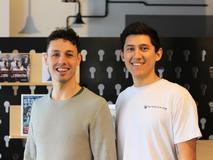CHF 40,000 for neuron regeneration, waste-to-energy plants, and EVs charging wirelessly
27.02.2025
Azure Cell Therapies, Jaipur Robotics, and Winduction were selected at Venture Kick's second financial and entrepreneurial support stage. Their projects push the boundaries of regenerative medicine by developing next-generation cell therapies for Parkinson’s disease; offer a SaaS solution for waste-to-energy plants to monitor waste piles using AI-driven cameras; and develop an inductive charging solution for EVs, enabling wireless and efficient energy transfer.
 |
 Azure Cell Therapies: Co-founder & CEO Dr. Bilal Fares, Research Associate Lena Grollmus, Science & Business Associate Dr. Olivia Cattaneo, Chair of the SAB Prof. Emi Nagoshi, and Co-founder & CSO Prof. Karl-Heinz Krause
|
 Jaipur Robotics: CEO Ermes Zamboni & CTO Nikhil Prakash
|
 Winduction: Co-Founders COO Sonam Bhuka & CTO Sylvain Fricker
|
Azure Cell Therapies: Regenerating Neurons to Defeat Parkinson’s Disease
Parkinson’s disease, an incurable and increasingly prevalent condition, continues to challenge modern medicine. Regenerative cell therapies promise to restore brain function by replacing the neurons lost during the progression of Parkinson’s disease, thereby directly addressing its root cause. However, critical challenges — such as ensuring safety, scalability, and sustained efficacy — must be overcome to unlock the full potential of this groundbreaking therapeutic approach.
Backed by two decades of pioneering research at the University of Geneva, Azure Cell Therapies is pushing the boundaries of regenerative medicine by developing next-generation cell therapies for Parkinson’s disease. The company leverages patented cell- and genetic-engineering platforms to generate neurons from stem cells in the lab, creating regenerative cell therapies designed to be safe (minimizing the risk of tumor formation), scalable (allogeneic with streamlined manufacturing), and capable of delivering long-lasting, disease-modifying outcomes.
Azure Cell Therapies is led by a world-class team of distinguished scientists and seasoned biotech entrepreneurs, including CEO Dr. Bilal Fares, a second-time biotech founder and expert in Parkinson’s R&D, and CSO Prof. Karl-Heinz Krause, a serial biotech entrepreneur and renowned leader in stem cell biology.
With support from Venture Kick, the company is accelerating its early business development efforts and collaborating with regulatory experts to fast-track its journey toward first-in-human clinical trials.
Jaipur Robotics: AI-powered waste recognition technology for Waste-to-Energy plants
Waste-to-energy (WtE) plants transform non-recyclable waste into electricity and heat. These plants face inefficiencies due to manual waste handling, leading to losses of up to USD 4.3M per plant annually. These losses result from unplanned downtime, electricity loss due to inefficient waste mixing, and labor shortages.
Jaipur Robotics offers a SaaS solution for waste-to-energy plants to monitor waste piles using AI-driven cameras. The system detects oversized and hazardous items, maps calorific value for optimal mixing, and provides real-time alerts to assist crane operators, enhancing operational efficiency and reducing costs. The founding team, Ermes Zamboni and Dr. Nikhil Prakash, brings an ETH Zurich educational background, combining engineering and machine learning expertise with extensive experience building automation technologies. The startup targets to tap into the USD 50 billion WtE industry.
With the Venture Kick Stage 1 grant, they plan to develop an upgraded sensor box with additional functionality and an improved website to attract potential clients.
Winduction: Enabling EVs to charge wirelessly while driving or standing
By 2050, 54 Mio. commercial EVs are on the road, using 8.5 TWh of energy daily. This electricity is typically generated by power plants, transferred to grid storage, and then to vehicle batteries—an inefficient process that depletes global mineral resources.
What if we could bypass this by transferring renewable energy directly to production? In other words, what if we were to transform the road infrastructure into invisible charging stations?
Winduction develops an inductive charging solution for EVs, enabling wireless and efficient energy transfer. The ETH spin-off focuses on the public transport sector and is in advanced discussions with leading Swiss public fleet operators to validate the technology's feasibility. Their solution integrates seamlessly into public transport systems, reducing downtime and enhancing sustainability. The global market is estimated at CHF 850 billion, with the European market at CHF 301 billion. The founding team includes two ETH Zurich and one HSG/HEC Paris graduate, combining expertise in engineering and business innovation.
Venture Kick’s funds will support the team to further develop its technology and business model, bringing Winduction closer to its first pilot projects, where vehicles are charged without human interaction.
Parkinson’s disease, an incurable and increasingly prevalent condition, continues to challenge modern medicine. Regenerative cell therapies promise to restore brain function by replacing the neurons lost during the progression of Parkinson’s disease, thereby directly addressing its root cause. However, critical challenges — such as ensuring safety, scalability, and sustained efficacy — must be overcome to unlock the full potential of this groundbreaking therapeutic approach.
Backed by two decades of pioneering research at the University of Geneva, Azure Cell Therapies is pushing the boundaries of regenerative medicine by developing next-generation cell therapies for Parkinson’s disease. The company leverages patented cell- and genetic-engineering platforms to generate neurons from stem cells in the lab, creating regenerative cell therapies designed to be safe (minimizing the risk of tumor formation), scalable (allogeneic with streamlined manufacturing), and capable of delivering long-lasting, disease-modifying outcomes.
Azure Cell Therapies is led by a world-class team of distinguished scientists and seasoned biotech entrepreneurs, including CEO Dr. Bilal Fares, a second-time biotech founder and expert in Parkinson’s R&D, and CSO Prof. Karl-Heinz Krause, a serial biotech entrepreneur and renowned leader in stem cell biology.
With support from Venture Kick, the company is accelerating its early business development efforts and collaborating with regulatory experts to fast-track its journey toward first-in-human clinical trials.
Jaipur Robotics: AI-powered waste recognition technology for Waste-to-Energy plants
Waste-to-energy (WtE) plants transform non-recyclable waste into electricity and heat. These plants face inefficiencies due to manual waste handling, leading to losses of up to USD 4.3M per plant annually. These losses result from unplanned downtime, electricity loss due to inefficient waste mixing, and labor shortages.
Jaipur Robotics offers a SaaS solution for waste-to-energy plants to monitor waste piles using AI-driven cameras. The system detects oversized and hazardous items, maps calorific value for optimal mixing, and provides real-time alerts to assist crane operators, enhancing operational efficiency and reducing costs. The founding team, Ermes Zamboni and Dr. Nikhil Prakash, brings an ETH Zurich educational background, combining engineering and machine learning expertise with extensive experience building automation technologies. The startup targets to tap into the USD 50 billion WtE industry.
With the Venture Kick Stage 1 grant, they plan to develop an upgraded sensor box with additional functionality and an improved website to attract potential clients.
Winduction: Enabling EVs to charge wirelessly while driving or standing
By 2050, 54 Mio. commercial EVs are on the road, using 8.5 TWh of energy daily. This electricity is typically generated by power plants, transferred to grid storage, and then to vehicle batteries—an inefficient process that depletes global mineral resources.
What if we could bypass this by transferring renewable energy directly to production? In other words, what if we were to transform the road infrastructure into invisible charging stations?
Winduction develops an inductive charging solution for EVs, enabling wireless and efficient energy transfer. The ETH spin-off focuses on the public transport sector and is in advanced discussions with leading Swiss public fleet operators to validate the technology's feasibility. Their solution integrates seamlessly into public transport systems, reducing downtime and enhancing sustainability. The global market is estimated at CHF 850 billion, with the European market at CHF 301 billion. The founding team includes two ETH Zurich and one HSG/HEC Paris graduate, combining expertise in engineering and business innovation.
Venture Kick’s funds will support the team to further develop its technology and business model, bringing Winduction closer to its first pilot projects, where vehicles are charged without human interaction.


